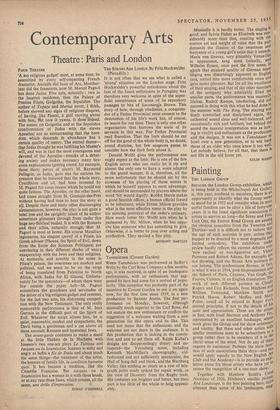Contemporary Arts
Theatre : Paris and London
PARIS THEATRE
'A BIG religious gadget' must, at some time, be assembled by every self-respecting French dramatist. Anouilh did Joan of Arc, Monther- lant did the Jansenists, now M. Marcel Pagnol has done Judas. Five acts, naturally: two in the Iscariot residence, then the Palace of Pontius Pilate, Golgotha, the Sepulchre. The author of Topaze and Marius never, I think, before showed any signs of religious disquiet, of having, like Pascal, a gulf moving about with him, LC now it yawns. It does indeed. The scenes on Golgotha and at the Sepulchre (confrontation of Judas with the eleven Apostles) are so embarrassing that the bore- dom which descends in abundance has a certain quality of mercy. The central theme— that Judas thought he was fulfilling his Master's will, and was in fact the most courageous and devoted of the Apostles—smacks of a debat- ing society and makes necessary many tire- some explanations (getting round, for example, those thirty pieces of silver). M. Raymond Pellegrin, as Judas, gave one the curious im- pression that he believed that the whole story, Crucifixion and all, had been invented by M. Pagnol for some reason which he could not quite fathom. The Apostles, on the other hand, had come straight from St. Germain-des-Prds without having had time to hear the story at al). Despite these and many other discouraging circumstances, however, the play is not quite a total loss and the sprightly talent of its author sometimes glimmers through from under this huge neo-Biblical bushel. It is with the Romans and their allies, naturally enough, that M. Pagnol is most at home. His coarse Massilian legionaries, his elegant sportif of a Pilate, his Greek adviser (Phocas, the Spirit of Evil, down from the Ecole des Sciences Politiques) are convincing in their different shades of weary exasperation with the Jews and their religions. At moments, and notably in the scene in Pilate's palace, the overtones are modern and political, and we seem to be on the verge of being translated from Palestine to North Africa, with Judas for El Glaoui. Unfortu- nately for the spectators—of whom there were few outside the paper belt—M. Pagnol remembers the grandeurs and servitudes of the driver of a big religious gadget and resumes, for the last two acts, his distressing competi- tion with the New Testament. The only really memorable performance is that of M. Jean Gervais in the difficult part of the Spirit of Evil. Wherever the script allows him, he is quiet, reasonable, modest and sympathetic, the Devil being a gentleman and a cut above all these uncouth Romans and hysterical Jews.
The avant-garde continues to make a stand at the little Theatre de la Huchette with Jonesco's two one-act plays Le Tableau and Jacques ou la Soumission. Jonesco is witty and angry as befits a fils de Dada and about much the same things—the treatment of the artist, the horrors of family life, la condition humaine quoi. It has became a tradition, like the Comedic Francaise. But Jacques ou la Soumission has a woman in it with three heads, or at any rate three faces, which creates, all the same, une drOle d'impression.
DONAT O'DONNELL


























































 Previous page
Previous page